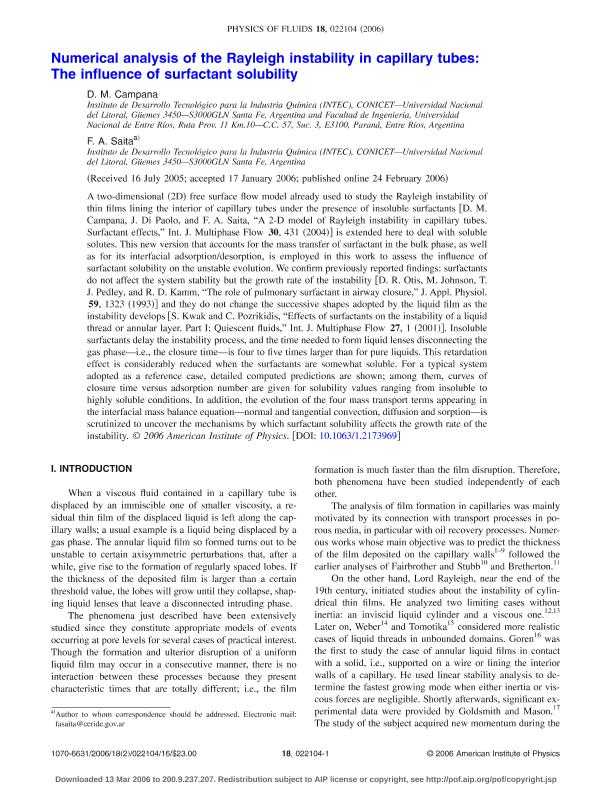Mostrar el registro sencillo del ítem
dc.contributor.author
Campana, Diego Martin

dc.contributor.author
Saita, Fernando Adolfo

dc.date.available
2017-10-10T17:49:29Z
dc.date.issued
2006-12
dc.identifier.citation
Campana, Diego Martin; Saita, Fernando Adolfo; Numerical analysis of the Rayleigh instability in capillary tubes: The influence of surfactant solubility; American Institute of Physics; Physics of Fluids; 18; 2; 12-2006; 1-16
dc.identifier.issn
1070-6631
dc.identifier.uri
http://hdl.handle.net/11336/26402
dc.description.abstract
A two-dimensional (2D) free surface flow model already used to study the Rayleigh instability of thin films lining the interior of capillary tubes under the presence of insoluble surfactants [D. M. Campana, J. Di Paolo, and F. A. Saita, “A 2-D model of Rayleigh instability in capillary tubes. Surfactant effects,” Int. J. Multiphase Flow 30, 431 (2004)] is extended here to deal with soluble solutes. This new version that accounts for the mass transfer of surfactant in the bulk phase, as well as for its interfacial adsorption/desorption, is employed in this work to assess the influence of surfactant solubility on the unstable evolution. We confirm previously reported findings: surfactants do not affect the system stability but the growth rate of the instability [D. R. Otis, M. Johnson, T. J. Pedley, and R. D. Kamm, “The role of pulmonary surfactant in airway closure,” J. Appl. Physiol. 59, 1323 (1993)] and they do not change the successive shapes adopted by the liquid film as the instability develops [S. Kwak and C. Pozrikidis, “Effects of surfactants on the instability of a liquid thread or annular layer. Part I: Quiescent fluids,” Int. J. Multiphase Flow 27, 1 (2001)]. Insoluble surfactants delay the instability process, and the time needed to form liquid lenses disconnecting the gas phase—i.e., the closure time—is four to five times larger than for pure liquids. This retardation effect is considerably reduced when the surfactants are somewhat soluble. For a typical system adopted as a reference case, detailed computed predictions are shown; among them, curves of closure time versus adsorption number are given for solubility values ranging from insoluble to highly soluble conditions. In addition, the evolution of the four mass transport terms appearing in the interfacial mass balance equation—normal and tangential convection, diffusion and sorption—is scrutinized to uncover the mechanisms by which surfactant solubility affects the growth rate of the instability.
dc.format
application/pdf
dc.language.iso
eng
dc.publisher
American Institute of Physics

dc.rights
info:eu-repo/semantics/openAccess
dc.rights.uri
https://creativecommons.org/licenses/by-nc-sa/2.5/ar/
dc.subject
Rayleigh
dc.subject
Instability
dc.subject
Surfactant
dc.subject.classification
Otras Ingeniería Química

dc.subject.classification
Ingeniería Química

dc.subject.classification
INGENIERÍAS Y TECNOLOGÍAS

dc.title
Numerical analysis of the Rayleigh instability in capillary tubes: The influence of surfactant solubility
dc.type
info:eu-repo/semantics/article
dc.type
info:ar-repo/semantics/artículo
dc.type
info:eu-repo/semantics/publishedVersion
dc.date.updated
2017-10-09T16:54:30Z
dc.journal.volume
18
dc.journal.number
2
dc.journal.pagination
1-16
dc.journal.pais
Estados Unidos

dc.description.fil
Fil: Campana, Diego Martin. Consejo Nacional de Investigaciones Científicas y Técnicas. Centro Científico Tecnológico Conicet - Santa Fe. Instituto de Desarrollo Tecnológico para la Industria Química. Universidad Nacional del Litoral. Instituto de Desarrollo Tecnológico para la Industria Química; Argentina
dc.description.fil
Fil: Saita, Fernando Adolfo. Consejo Nacional de Investigaciones Científicas y Técnicas. Centro Científico Tecnológico Conicet - Santa Fe. Instituto de Desarrollo Tecnológico para la Industria Química. Universidad Nacional del Litoral. Instituto de Desarrollo Tecnológico para la Industria Química; Argentina
dc.journal.title
Physics of Fluids

dc.relation.alternativeid
info:eu-repo/semantics/altIdentifier/doi/http://dx.doi.org/10.1063/1.2173969
dc.relation.alternativeid
info:eu-repo/semantics/altIdentifier/url/http://aip.scitation.org/doi/10.1063/1.2173969
Archivos asociados
